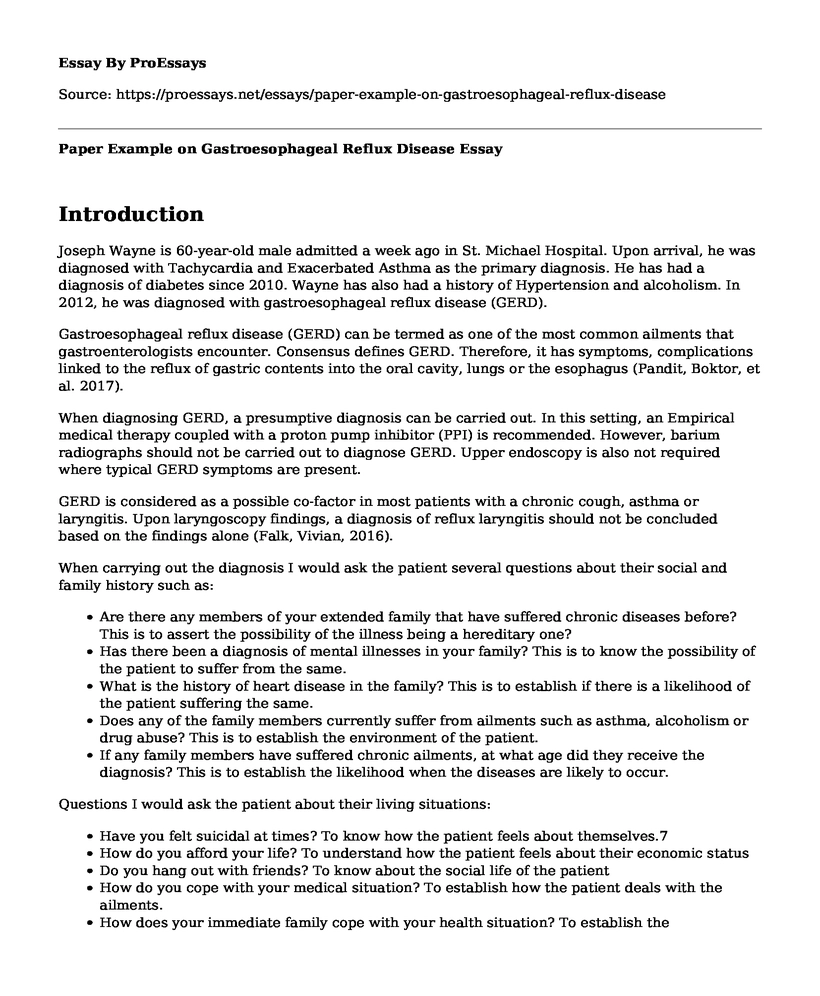Introduction
Joseph Wayne is 60-year-old male admitted a week ago in St. Michael Hospital. Upon arrival, he was diagnosed with Tachycardia and Exacerbated Asthma as the primary diagnosis. He has had a diagnosis of diabetes since 2010. Wayne has also had a history of Hypertension and alcoholism. In 2012, he was diagnosed with gastroesophageal reflux disease (GERD).
Gastroesophageal reflux disease (GERD) can be termed as one of the most common ailments that gastroenterologists encounter. Consensus defines GERD. Therefore, it has symptoms, complications linked to the reflux of gastric contents into the oral cavity, lungs or the esophagus (Pandit, Boktor, et al. 2017).
When diagnosing GERD, a presumptive diagnosis can be carried out. In this setting, an Empirical medical therapy coupled with a proton pump inhibitor (PPI) is recommended. However, barium radiographs should not be carried out to diagnose GERD. Upper endoscopy is also not required where typical GERD symptoms are present.
GERD is considered as a possible co-factor in most patients with a chronic cough, asthma or laryngitis. Upon laryngoscopy findings, a diagnosis of reflux laryngitis should not be concluded based on the findings alone (Falk, Vivian, 2016).
When carrying out the diagnosis I would ask the patient several questions about their social and family history such as:
- Are there any members of your extended family that have suffered chronic diseases before? This is to assert the possibility of the illness being a hereditary one?
- Has there been a diagnosis of mental illnesses in your family? This is to know the possibility of the patient to suffer from the same.
- What is the history of heart disease in the family? This is to establish if there is a likelihood of the patient suffering the same.
- Does any of the family members currently suffer from ailments such as asthma, alcoholism or drug abuse? This is to establish the environment of the patient.
- If any family members have suffered chronic ailments, at what age did they receive the diagnosis? This is to establish the likelihood when the diseases are likely to occur.
Questions I would ask the patient about their living situations:
- Have you felt suicidal at times? To know how the patient feels about themselves.7
- How do you afford your life? To understand how the patient feels about their economic status
- Do you hang out with friends? To know about the social life of the patient
- How do you cope with your medical situation? To establish how the patient deals with the ailments.
- How does your immediate family cope with your health situation? To establish the acceptability of the patient by their family.
Resources
Falk, G. L., & Vivian, S. J. (2016). Laryngopharyngeal reflux: diagnosis, treatment, and latest research. European Surgery, 48(2), 74-91.
Pandit, S., Boktor, M., Alexander, J. S., Becker, F., & Morris, J. (2017). Gastroesophageal reflux disease: A clinical overview for primary care physicians. Pathophysiology.
Cite this page
Paper Example on Gastroesophageal Reflux Disease. (2022, Jun 19). Retrieved from https://proessays.net/essays/paper-example-on-gastroesophageal-reflux-disease
If you are the original author of this essay and no longer wish to have it published on the ProEssays website, please click below to request its removal:
- Using Health Information Technology as a Source of Evidence-Based Practice
- Informatics Technology: Revolutionizing Nursing Care & Health Outcomes - Essay Sample
- Essay Sample on School-Based Programs: Reducing Tooth Decay in Kids
- Essay on Evaluating the Advantages of Fee-For-Service Payment for Healthcare
- Essay Example on Cultural Respect in Nursing Healthcare: Impact of Culture on Decisions & Outcomes
- Paper Example on Lack of Dental Care Access for Hispanics: Barriers and Solutions
- Paper Sample on Study Q: Does Zona Genes/mRNA Affect Oocyte Info Revelation?







